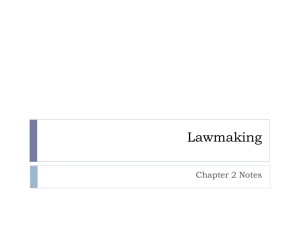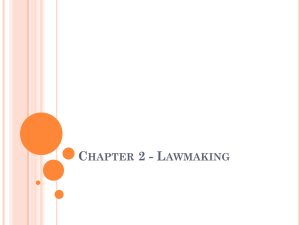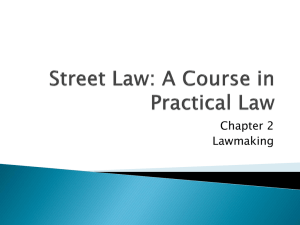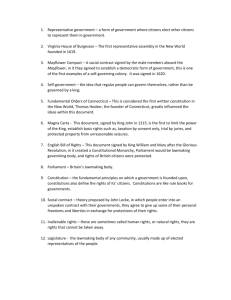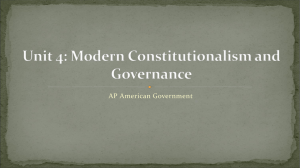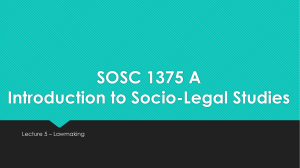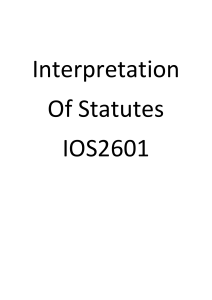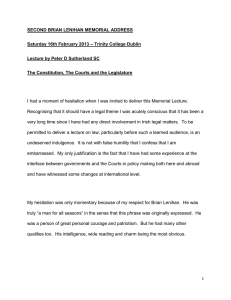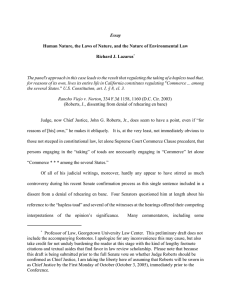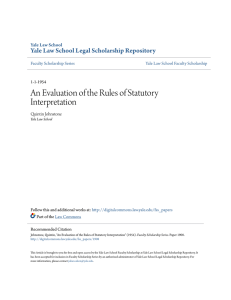Chapter 2 Lawmaking
advertisement
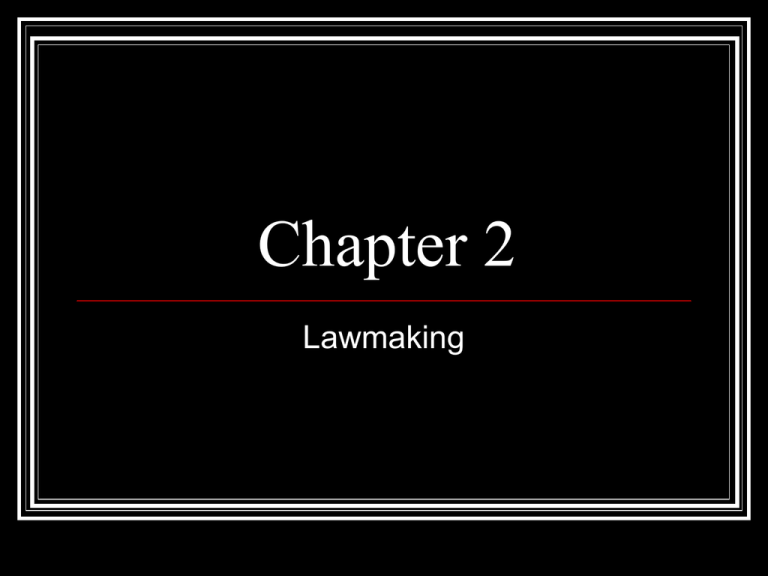
Chapter 2 Lawmaking Legislatures ■ ■ ■ ■ ■ The federal government has a legislative branch is made up of two houses - Senate, House of Representatives When a law is introduced in either house it is called a bill Congress has the power to pass laws that are binding on people in every state Congress passes federal laws that are called statutes Federal statutes deal with things such as national defense, taxes, civil rights, postal services, economic development etc. States ■ ■ States have the power to pass laws that apply within their boundaries In general the states have the power to legislate in all those areas over which the national government was not granted power by the Constitution Supremacy Clause ■ ■ ■ If two laws conflict between the federal government and the state government, the federal government law will be followed. The supremacy clause states that the Constitution and federal laws are “The Supreme Law of the Land”. Legislative intent - judges must determine what the writer of the law intended when it was written Problem 2.1 No Vehicles allowed in the park ■ ■ First complete activity 2.2 on your own. Make sure you have reasons to support your answers Secondly, get into groups of 2 and try to persuade others in your group to the correctness and validity of your answers. Come to a consensus as a group and provide reasons for your answers Drafting a Bill ■ ■ Legislation is often drafted and re-drafted Questions to ask when drafting laws or rules ■ ■ ■ ■ ■ ■ Is the law written in clear language? Is the law understandable? When does the law go into effect? Does the law contradict any other laws? Is the law enforceable? If so, by whom? Are the penalties for breaking the law clear and reasonable Drafting a Bill Cont…… ■ ■ ■ Clarity in legal language is important Recently law has been written in simple, clear English Advocates argue they should be written this way so that a person of ordinary intelligence and education can understand what is expected Agencies ■ ■ Legislative bodies deal with problems in a general way Administrative agencies develop rules & regs to be more specific ■ ■ EX: OSHA, EPA, DOT Agencies with greatest impact are at the state & local level ■ EX: school board, zoning commission Agencies Cont…. ■ ■ What might the agencies discuss or determine for you? Public hearings are held because…. ■ Businesses or individuals to express opinion on issue COURTS ■ ■ ■ Describe court cases/shows you’ve seen on T.V. They were trials If you lose you can ask a higher court to review and change the result ■ ■ Verdict of Appeal sets a precedent ■ ■ Called Appeals or Appellate Courts Lower courts must follow this Can you give me an example? International Lawmaking ■ ■ Applies to conduct of Countries Often made through a TREATY ■ ■ What is a treaty? Treaties regulate ■ ■ ■ Money among countries Refugees crossing national borders The environment International Lawmaking Cont…. ■ U.S. Constitution states…a treaty is the supreme law of the land if signed by the President and Ratified by 2/3 of the Senate UNITED NATIONS ■ ■ ■ ■ ■ ■ Formed in 1945 Headquartered in New York City 200 member countries Maintains system of International Courts Most important institution for international law Member countries agree to abide by rules of the U.N.
